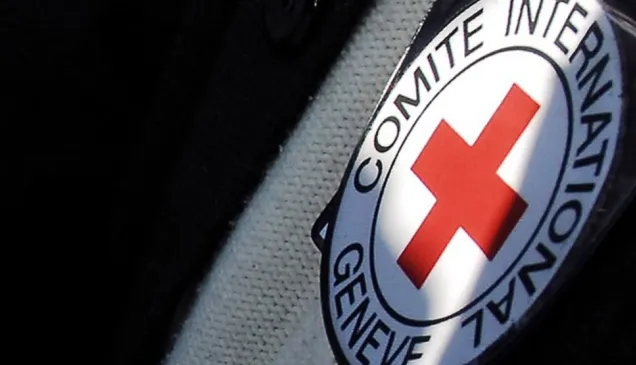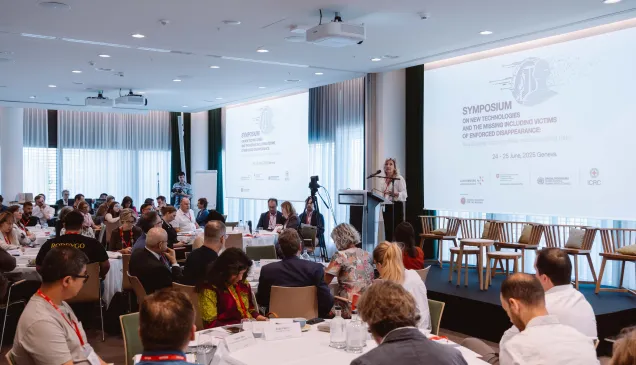ICRC President Mirjana Spoljaric: “The immense destruction and despair should not let us forget that wars have rules”

As flagrant violations of international humanitarian law regularly occur, Mirjana Spoljaric asserts the relevance of the Geneva Conventions - setting clear limits to violence in war – and urgently calls upon States to make international humanitarian law their political priority, to respect principled humanitarian action and personnel and to preserve peace.
Speech given by Mirjana Spoljaric, President of the International Committee of the Red Cross, at the 55th session of the Human Rights Council, Geneva.
President, excellencies, ladies and gentlemen,
People living in armed conflicts are suffering beyond what words can describe.
They barely survive in the rubbles of their cities and in overcrowded camps.
They die in hospitals under attack.
Women agonize giving birth because basic essential medicine and services are missing.
Children grow up hungry and with constant fear.
Persons with disabilities cannot flee because of inaccessible warnings, shelters, and evacuations.
Families struggle with the pain of not knowing the fate of their loved ones – missing, detained or held hostage.
The immense destruction and despair should not let us forget: Wars have rules. International human rights law and international humanitarian law share a common objective – to protect the lives and dignity of all human beings.
75 years ago, states voluntarily agreed to be bound by these laws. Their rules remain relevant and utterly clear.
75 years ago, states rallied around a humanitarian imperative to control the behavior of warring parties and a shared interest to set limits to violence in war.
Today, the Geneva Conventions are ratified by all States. They form the strongest international consensus.
However, challenges to the relevance and effectiveness of international humanitarian law are evident:
- Violations regularly occur under the watch of the international community.
- Exceptions to its application are created.
- Reciprocity and transactional arguments are invoked to justify disrespect for the rules of war and basic values of humanity.
The continuous suffering in armed conflicts does not point to the ineffectiveness of international humanitarian law but to the non-compliance by warring parties and states that support them.
In October, during the International Conference of the Red Cross and Red Crescent, we must come together to reaffirm this consensus and our common commitment to compliance with international humanitarian law.
Excellencies,
Besides the letter of the law, I must recall the fundamental values on which international humanitarian law was founded.
First and foremost, humanity.
The Geneva Conventions were created to preserve a minimum of humanity in even the most difficult situations, to prevent the dehumanization of the other, and to help maintain a pathway back to peace.
Second and equally importantly, equality.
Equality, as the fundamental notion of humanity, is everywhere we look in modern international law. Humanity and equality are enshrined in the UN Charter, the Universal Declaration of Human Rights, as well as the Geneva Conventions. All speak to the dignity, worth and equal rights of all individuals.
Irrelevant of the side of the frontline they find themselves in, the lives and dignity of a civilian or a captured combatant are of equal worth.
Both the International Committee of the Red Cross and the Human Rights Council work towards ensuring states uphold these fundamental values.
As President of the ICRC, I will seize every opportunity to urge you:
First – to make compliance with international humanitarian law your political priority.
It is your collective responsibility to prevent and reduce the cost of war by implementing international humanitarian law and ensuring its respect around the world. Protecting our shared humanity means not only upholding the letter of the Geneva Conventions but also its spirit.
Second – to protect and preserve neutral, independent and impartial humanitarian action and personnel.
Respect our neutrality and enable our independence, as they are our best tools to access those in need and to influence the behaviors of those who hold power and weapons.
However, international humanitarian law alone will never ensure the safety and dignity of people. Principled humanitarian action alone will never be enough to alleviate all the suffering.
They will not change what war intrinsically is: an assault on our common humanity.
Therefore, my third urgent call to you is to do your utmost to preserve peace, avoid the escalation of violence and ensure that conflict does not become the norm.
Thank you.



